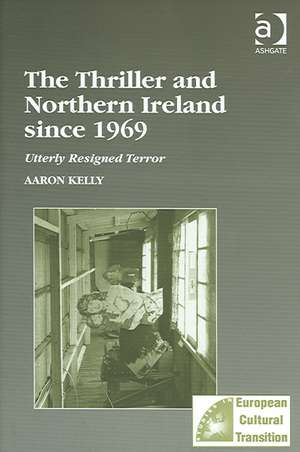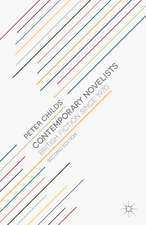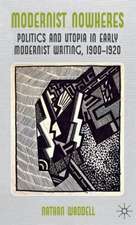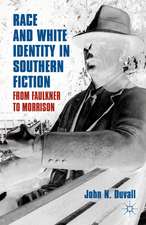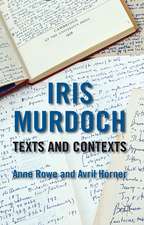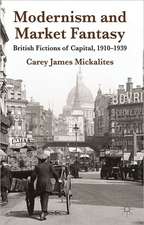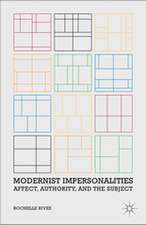The Thriller and Northern Ireland since 1969: Utterly Resigned Terror: Studies in European Cultural Transition
Autor Aaron Kellyen Limba Engleză Hardback – 28 mai 2005
| Toate formatele și edițiile | Preț | Express |
|---|---|---|
| Paperback (1) | 436.14 lei 6-8 săpt. | |
| Taylor & Francis – 6 iun 2019 | 436.14 lei 6-8 săpt. | |
| Hardback (1) | 764.62 lei 6-8 săpt. | |
| Taylor & Francis – 28 mai 2005 | 764.62 lei 6-8 săpt. |
Din seria Studies in European Cultural Transition
- 13%
 Preț: 338.33 lei
Preț: 338.33 lei - 25%
 Preț: 501.74 lei
Preț: 501.74 lei - 16%
 Preț: 238.48 lei
Preț: 238.48 lei - 26%
 Preț: 764.62 lei
Preț: 764.62 lei - 13%
 Preț: 338.33 lei
Preț: 338.33 lei - 17%
 Preț: 247.40 lei
Preț: 247.40 lei -
 Preț: 469.34 lei
Preț: 469.34 lei - 25%
 Preț: 486.20 lei
Preț: 486.20 lei - 25%
 Preț: 767.07 lei
Preț: 767.07 lei -
 Preț: 264.86 lei
Preț: 264.86 lei - 9%
 Preț: 935.37 lei
Preț: 935.37 lei - 31%
 Preț: 766.24 lei
Preț: 766.24 lei - 12%
 Preț: 299.52 lei
Preț: 299.52 lei - 16%
 Preț: 130.21 lei
Preț: 130.21 lei - 26%
 Preț: 736.38 lei
Preț: 736.38 lei -
 Preț: 467.26 lei
Preț: 467.26 lei - 18%
 Preț: 1000.27 lei
Preț: 1000.27 lei -
 Preț: 436.14 lei
Preț: 436.14 lei -
 Preț: 430.96 lei
Preț: 430.96 lei -
 Preț: 323.23 lei
Preț: 323.23 lei - 12%
 Preț: 299.52 lei
Preț: 299.52 lei -
 Preț: 436.14 lei
Preț: 436.14 lei - 13%
 Preț: 338.33 lei
Preț: 338.33 lei - 13%
 Preț: 334.55 lei
Preț: 334.55 lei -
 Preț: 482.94 lei
Preț: 482.94 lei - 12%
 Preț: 325.34 lei
Preț: 325.34 lei
Preț: 764.62 lei
Preț vechi: 1027.66 lei
-26% Nou
Puncte Express: 1147
Preț estimativ în valută:
146.31€ • 152.46$ • 121.14£
146.31€ • 152.46$ • 121.14£
Carte tipărită la comandă
Livrare economică 03-17 aprilie
Preluare comenzi: 021 569.72.76
Specificații
ISBN-13: 9780754638391
ISBN-10: 0754638391
Pagini: 224
Dimensiuni: 156 x 234 mm
Greutate: 0.48 kg
Ediția:1
Editura: Taylor & Francis
Colecția Routledge
Seria Studies in European Cultural Transition
Locul publicării:Oxford, United Kingdom
ISBN-10: 0754638391
Pagini: 224
Dimensiuni: 156 x 234 mm
Greutate: 0.48 kg
Ediția:1
Editura: Taylor & Francis
Colecția Routledge
Seria Studies in European Cultural Transition
Locul publicării:Oxford, United Kingdom
Cuprins
Contents: Introduction: 'You didn't need a reason to kill people, not here': narrative, the north, and historical agency; 'The green unpleasant land': the political unconscious of the British 'Troubles' thriller; 'And what do you call it?': the thriller and the problematics of home in Northern Irish writing; 'New languages would have to be invented': representations of Belfast and urban space; 'A man could get lost': constructions of gender; 'It's not for the likes of us to philosophize': the pleasure and politics of thrills, or, towards a political aesthetics; Appendices; Bibliography; Index.
Recenzii
’Kelly's monograph is to be welcomed [...] for subjecting the formal and ideological dimensions of this variegated literary corpus to systematic, theorized investigation. This absorbing [...] study of the 'Troubles' thriller genre significantly expands the critical frameworks within which contemporary Northern Irish fiction can be read.’ Modern Language Review
Notă biografică
Aaron Kelly is a Lecturer in Modern and Contemporary Literature in English at the University of Edinburgh, UK.
Descriere
For the past 30 years, the so-called Troubles thriller has been the dominant fictional mode for representing Northern Ireland, leading to the charge that the crudity of this popular genre appropriately reflects the social degradation of the North. Aaron Kelly challenges both these judgments, showing that the historical questions raised by setting a thriller in Northern Ireland disrupt the conventions of the crime novel and allow for a new understanding of both the genre and the country. Viewing Irish culture and the crime novel through the lens of key European thinkers, including Walter Benjamin, Berthold Brecht, and Louis Althusser, Kelly refutes the idea that Northern Ireland is a stagnate anomaly that has been bypassed by European history and remained impervious to cultural transformation. On the contrary, Kelly's examination of authors such as Jack Higgins, Tom Clancy, Gerald Seymour, Colin Bateman, and Eoin McNamee shows that profound historical change and complexity have characterized both Northern Ireland and the thriller form.
